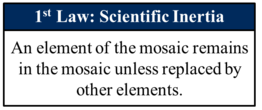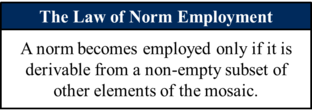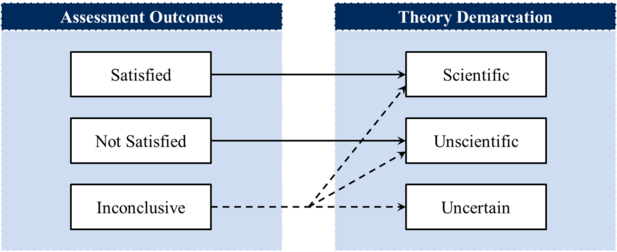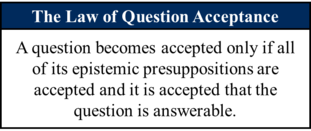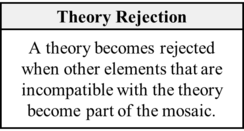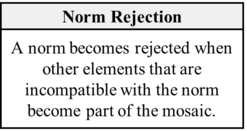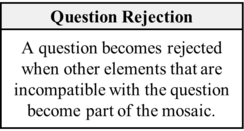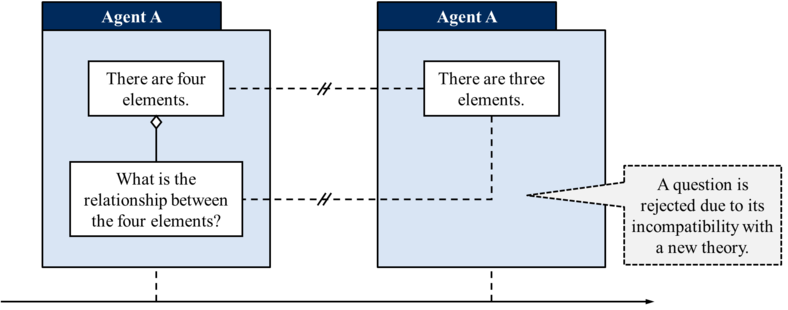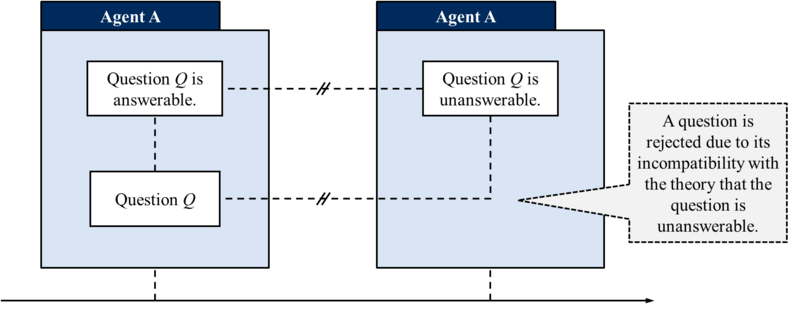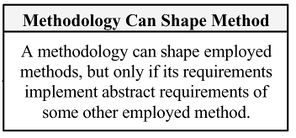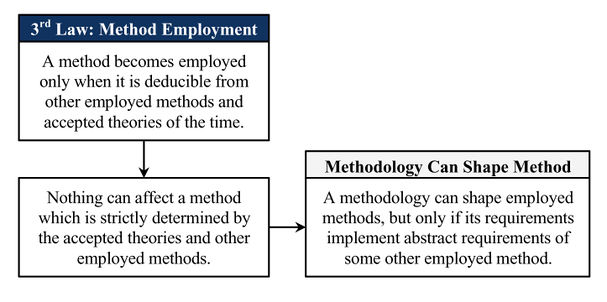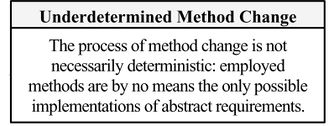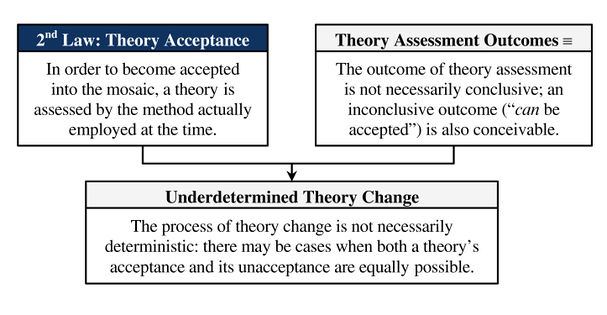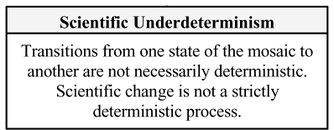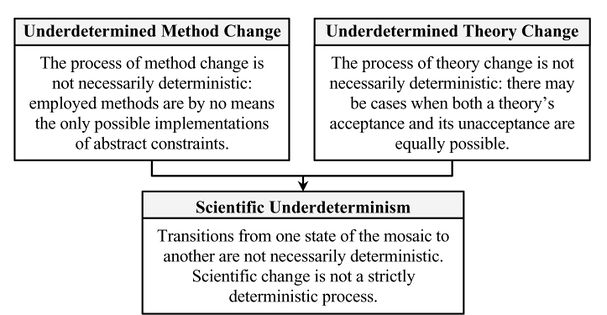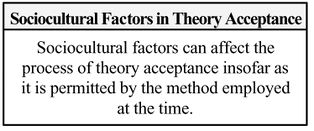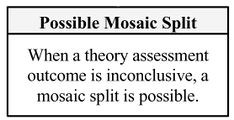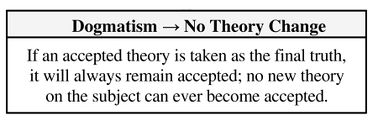Mechanism of Scientific Change
What is the mechanism of scientific change? How do epistemic agents take stances towards epistemic elements? How do changes in a scientific mosaic take place?
Along with the question of the ontology of scientific change, this question is one of the two most general questions of scientonomy. It is safe to say that any general theory that attempts to explain changes in a certain domain normally has two major ingredients – an ontology of the entities and relations that populate the domain as well as some dynamics of how these entities and relations change over time. Scientonomy is no exception as it attempts to understand what sort of elements, agents, and stances, play part in the process of scientific change (ontology) and what the mechanism of these changes is (dynamics). Answering both of these questions is crucial for our understanding of the process of scientific change.
In the scientonomic context, this question was first formulated by Hakob Barseghyan in 2015. The question is currently accepted as a legitimate topic for discussion by Scientonomy community.
In Scientonomy, the accepted answers to the question can be summarized as follows:
- An element of the mosaic remains in the mosaic unless replaced by other elements.
- If a theory satisfies the acceptance criteria of the method employed at the time, it becomes accepted into the mosaic; if it does not, it remains unaccepted; if assessment is inconclusive, the theory can be accepted or not accepted.
- A norm becomes employed only if it is derivable from a non-empty subset of other elements of the mosaic.
- If a pair of elements satisfies the compatibility criteria employed at the time, it becomes compatible within the mosaic; if it does not, it is deemed incompatible; and if assessment is inconclusive, the pair can become compatible, incompatible, or its status may be unknown.
- A question becomes accepted only if all of its epistemic presuppositions are accepted and it is accepted that the question is answerable.
- A theory becomes rejected when other elements that are incompatible with the theory become part of the mosaic.
- A norm becomes rejected when other elements that are incompatible with the norm become part of the mosaic.
- A question becomes rejected when other elements that are incompatible with the question become part of the mosaic.
- A methodology can shape employed methods, but only if its requirements implement abstract requirements of some other employed method.
- Transitions from one state of the mosaic to another are not necessarily deterministic. Scientific change is not a strictly deterministic process. The process of method change is not necessarily deterministic: employed methods are by no means the only possible implementations of abstract requirements. The process of theory change is not necessarily deterministic: there may be cases when both a theory's acceptance and its unacceptance are equally possible.
- Sociocultural factors can affect the process of theory acceptance insofar as it is permitted by the method employed at the time.
- When two mutually incompatible theories satisfy the requirements of the current method, the mosaic necessarily splits in two. When a theory assessment outcome is inconclusive, a mosaic split is possible. When a mosaic split is a result of the acceptance of only one theory, it can only be a result of inconclusive theory assessment.
- If an accepted theory is taken as the final truth, it will always remain accepted; no new theory on the subject can ever be accepted.
Contents
- 1 Broader History
- 2 Scientonomic History
- 3 Current View
- 3.1 Mechanism of Scientific Inertia for Epistemic Elements
- 3.2 Mechanism of Theory Acceptance
- 3.3 Mechanism of Norm Employment
- 3.4 Mechanism of Compatibility
- 3.5 Mechanism of Question Acceptance
- 3.6 Mechanism of Theory Rejection
- 3.7 Mechanism of Normative Theory Rejection
- 3.8 Mechanism of Question Rejection
- 3.9 Role of Methodology in Scientific Change
- 3.10 Determinism vs. Underdeterminism in Scientific Change
- 3.11 Role of Sociocultural Factors in Scientific Change
- 3.12 Mechanism of Mosaic Split
- 3.13 Changeability of the Scientific Mosaic
- 4 Related Topics
Broader History
Ludwik Fleck
Ludwik Fleck, an epidemiologist, made one of the earliest attempts to understand scientific change as a social process, and to develop a conceptual framework for understanding how scientific communities function.1 His most comprehensive work was Genesis and Development of a Scientific Fact published in 1935.2 For Fleck, cognition was necessarily a collective social activity, since it depends on prior knowledge obtained from other people. New ideas arise within thought collectives, which are groups of people who participate in the mutual exchange of ideas. As an emergent consequence of mutual understandings and misunderstandings within such a group a particular thought style arises. An established thought style carves the social world into an esoteric circle of expert members of the thought collective, and an exoteric circle who are outside the thought collective. How individual members of a thought collective think and perceive within the relevant domain is determined by the thought style. Scientific facts are socially constructed by thought collectives. Reality in itself cannot be known, but the thought style can be compared with reality through observation and experiment, and may be revised or abandoned on the basis of such interactions.2 1 The thought style of a particular collective can, at most, be only partially understood by members of other collectives, and may be completely incommensurable with the thinking of some other collectives.
Thomas Kuhn
Drawing partially on Fleck’s ideas, physicist and historian of science Thomas Kuhn published his ideas about scientific change as The Structure of Scientific Revolutions in 1962.3 Kuhn spoke of scientific paradigms, which are constellations of theoretical and metaphysical beliefs, values, methods, and instrumental techniques shared by a scientific discipline. A paradigm determines which questions are asked of the natural world by observation and experiment. Adherents to a paradigm engage in normal science, which solves the puzzles needed to expand the range of natural phenomena that can be explained using the paradigm. Eventually, anomalies may be unearthed. These are phenomena that recalcitrantly resist explanation in terms of the paradigm. If anomalies persist and grow in number, practitioners seek fundamentally new approaches. If a new approach is successful at resolving salient anomalies and is deemed to hold promise for solving new puzzles, a scientific revolution may result, in which a new paradigm replaces the old. Because paradigms are holistic networks of theories, methods, and values, they are incommensurable with one another, meaning that the terms and categories of the old paradigm cannot be translated into those of the new. Adoption of a new paradigm thus appeared, especially to Kuhn’s critics, to involve a kind of non-rational leap of faith.43
Paul Feyerabend
In his Against Method, published in 1975, philosopher Paul Feyerabend, an epistemic anarchist, launched a much more radical attack on the idea of a fixed scientific method, and on the rationality of science.5 On his account, science does not possess the regularities that would make a science of science and a theory of scientific change possible. Social constructivists likewise favored an historically contingent, relativist, and particularist view of science, which they supposed was incompatible with a coherent theory of scientific change.
Irme Lakatos
Philosopher Irme Lakatos, a proponent of the rationality of science and of a fixed scientific method launched a new account of scientific change with his Methodology of Scientific Research Programs in 1970.6 Lakatos sought to challenge both Kuhn and Feyerabend. He saw interrelated scientific theories as constituting research programs. Unlike Kuhn, he believed that scientific fields typically host multiple competing research programs and rejected the idea of coherent unitary paradigms. Not all theoretical constituents of a research program were assigned equal importance. The hard core of a research program consisted of those theoretical claims that were indispensable to it. Adherents to a research program attempt to explain an increasingly wide range of natural phenomena in terms of the core claims. This is the positive heuristic of the research program. The protective belt consists of those theoretical assumptions that allowed the application of the hard core to an increasing range of cases. Scientists used their ingenuity to protect the hard core by making alterations to the protective belt so as to protect the core from falsification. The protection of the hard core is a research program's negative heuristic. A progressive research program is one that makes successful novel predictions. A degenerating research program is one whose predictions repeatedly fail, and whose protective belt must be altered in an arbitrary, ad hoc fashion to protect the hard core from falsification. Lakatos rejected Kuhn’s distinction between normal and revolutionary science, and supposed that a revolution occurs when scientists simply switch allegiance from a degenerating research program to a progressive one.
Larry Laudan
In his 1984 Science and Values philosopher Larry Laudan accepted growing empirical evidence that the methods of science had changed with time.78 "Our views about the proper procedures for investigating the world", he wrote, "have been significantly affected by our shifting beliefs about how the world works".8p. 39 However he did not accept Feyerabend’s anarchism, or his view that a coherent theory of scientific change was impossible. Laudan proposed a reticulated model of scientific rationality in which other theories, methods, and research aims all interact in the assessment of a theory, with all three subject to alteration or replacement in the light of the others. Like Lakatos, he supposed that scientific theories were linked into logically related groups which he called research traditions, and rejected the radical holism of Kuhnian paradigms. Laudan distinguished between the acceptance of a theory by a scientific community as the best available and pursuit of a theory as holding potential. Similar ideas were adopted as part of the Barseghyan theory of scientific change.9
Scientonomic History
Acceptance Record of the Question
| Community | Accepted From | Acceptance Indicators | Still Accepted | Accepted Until | Rejection Indicators |
|---|---|---|---|---|---|
| Scientonomy | 1 January 2016 | This is when the community accepted its first answer to this question, The Theory of Scientific Change, which indicates that the question itself is legitimate. | Yes |
All Direct Answers
If a direct answer to this question is missing, please click here to add it.
Accepted Direct Answers
Suggested Modifications
Current View
In Scientonomy, the accepted answers to the question are The First Law (Barseghyan-2015), The Second Law (Patton-Overgaard-Barseghyan-2017), The Law of Norm Employment (Rawleigh-2022), The Law of Compatibility (Fraser-Sarwar-2018), The Law of Question Acceptance (Barseghyan-Levesley-2021), Theory Rejection theorem (Barseghyan-Pandey-2023), Norm Rejection theorem (Pandey-2023), Question Rejection theorem (Barseghyan-Levesley-Pandey-2023), Methodology Can Shape Method theorem (Barseghyan-2015), Underdetermined Method Change theorem (Barseghyan-2015), Underdetermined Theory Change theorem (Barseghyan-2015), Scientific Underdeterminism theorem (Barseghyan-2015), Sociocultural Factors in Theory Acceptance theorem (Barseghyan-2015), Necessary Mosaic Split theorem (Barseghyan-2015), Possible Mosaic Split theorem (Barseghyan-2015), Split Due to Inconclusiveness theorem (Barseghyan-2015) and Dogmatism No Theory Change theorem (Barseghyan-2015).
Mechanism of Scientific Inertia for Epistemic Elements
The First Law (Barseghyan-2015) states: "An element of the mosaic remains in the mosaic unless replaced by other elements."
The following passage from The Laws of Scientific Change summarizes the gist of the law:
According to the first law, any element of the mosaic of accepted theories and employed methods remains in the mosaic except insofar as it is overthrown by another element or elements. Basically, the law assumes that there is certain inertia in the scientific mosaic: once in the mosaic, elements remain in the mosaic until they get replaced by other elements. It is reasonable therefore to call it the law of scientific inertia.9p. 123
Mechanism of Theory Acceptance
The Second Law (Patton-Overgaard-Barseghyan-2017) states: "If a theory satisfies the acceptance criteria of the method employed at the time, it becomes accepted into the mosaic; if it does not, it remains unaccepted; if assessment is inconclusive, the theory can be accepted or not accepted."
According to this formulation of the second law, if a theory satisfies the acceptance criteria of the method actually employed at the time, then it becomes accepted into the mosaic; if it does not, it remains unaccepted; if it is inconclusive whether the theory satisfies the method, the theory can be accepted or not accepted.
Unlike the previous formulation of the second law, this formulation makes the causal connection between theory assessment outcomes and cases of theory acceptance/unacceptance explicit. In particular, it specifies what happens to a theory in terms of its acceptance/unacceptance when a certain assessment outcome obtains.
In addition, this new formulation is clearly not a tautology because it forbids certain logically possible scenarios, such as a theory satisfying the method of the time yet remaining unaccepted.
Mechanism of Norm Employment
The Law of Norm Employment (Rawleigh-2022) states: "A norm becomes employed only if it is derivable from a non-empty subset of other elements of the mosaic."
Sebastien's law of method employment faces several problems. Foremost among these is that it is based on an outdated ontology that assumes that methods of theory evaluation are a fundamental epistemic element. After the acceptance of Barseghyan’s proposal that methods be subsumed under the category of normative theories, the third law no longer exhaustively covers all situations cases of employment. In its present form it is limited to methods, though there is no reason to think that the mechanism by which a method is employed is any different than the mechanism by which any other norm is employed.
In addition, Sebastien's formulation of the third law uses the term deducible, which currently lacks a scientonomic definition. We do not currently know what it means for something to be deducible, what the criteria of deducibility would be, or whether the conditions of deducibility would be part of the first-order theories of the mosaic or part of the second-order theories that range over the mosaic.
The third issue with Sebastien's formulation is that, with the acceptance of questions into the epistemic elements of the ontology of scientific change, the elements of the mosaic are now more expansive than just theories and subtypes of theories. This means that there is a plausible situation in which norms could potentially be derived – at least in part – from questions, which means that a formulation of the third law that excludes questions would fail to comprehensively describe all cases of norm employment.
The new law of norm employment aims to remedy all three of these issues:
- the formulation of the covers all norms rather than only methods;
- it replaces a deducible with derivable, which in the context of mathematical model theory simply means to be semantically entailed, and thus can potentially include non-deductive inferences (e.g. inductive, abductive);
- it replaces a specific enumeration of epistemic elements with a general "elements of the mosaic".
This formulation also offers the slight clarification that derivability strictly deals with derivation from a finite number of other elements.
Mechanism of Compatibility
The Law of Compatibility (Fraser-Sarwar-2018) states: "If a pair of elements satisfies the compatibility criteria employed at the time, it becomes compatible within the mosaic; if it does not, it is deemed incompatible; and if assessment is inconclusive, the pair can become compatible, incompatible, or its status may be unknown."
The law of compatibility links the compatibility criteria with various assessment outcomes. If compatibility is defined as the ability of a pair of elements to co-exist in the same mosaic, then the assessment for compatibility is essentially the process by which the epistemic agent decides whether any given pair of elements (i.e. theories, questions, methods) can be simultaneously part of their mosaic. Such an assessment can yield three possible outcomes - satisfied, not satisfied, and inconclusive.10p. 73 Accordingly, the law of compatibility states that if a pair of elements does satisfy the compatibility criteria of the time, then it is deemed as compatible. If, however, an element is taken to be incompatible with the other one, then the pair is deemed as incompatible. Finally, the assessment of compatibility may be inconclusive. In this case, the pair may be deemed compatible, incompatible, or its status may remain unknown. The diagram below summarizes the relation between assessment outcomes and their effects:
Mechanism of Question Acceptance
The Law of Question Acceptance (Barseghyan-Levesley-2021) states: "A question becomes accepted only if all of its epistemic presuppositions are accepted and it is accepted that the question is answerable."
First, the law implies that the acceptance of a question is predicated upon the acceptance of all of its epistemic presuppositions. Importantly, the law works with the notion of epistemic presupposition, rather than logical presupposition, as it would be unreasonable to expect that all logical presuppositions of a question can ever be accepted. This is due to the inherent "explosiveness" of logical presuppositions: if question Q presupposes theory T1 and T1 logically implies theory T2, then question Q also presupposes theory T2. But since a theory can have an infinite number of logical consequences, a question can also have an infinite number of logical presuppositions. For instance, among logical presuppositions of the question 'What is the distance between the Earth and the sphere of the stars?' are not only theories 'The Earth exists' and 'The sphere of the stars exists', but also 'The Earth exists or God exists', 'The Earth exists or it is made of cheese', 'The sphere of the stars exists or God exists', 'The sphere of the stars exists or it is made of cheese' and so on.11p. 6 In contrast, the epistemic presuppositions of a question are not explosive as they are agent-dependent: "what can be a presupposition for one agent need not necessarily qualify as a presupposition for another agent".11p. 5 As explained by Barseghyan and Levesley:
A theory would count as an epistemic presupposition of a certain question for an agent, only if the agent is prepared to accept that theory when they accept an answer to the question, irrespective of what that answer is. Consider, for example an epistemic agent who, when accepting p, nevertheless does not accept p-or-q in order not to clutter their mosaic and avoid explosion. For such an agent, not all logical presuppositions of a question would count as epistemic presuppositions.11p. 5
Thus, for most agents, such theories as 'The Earth exists or God exists' and 'The Earth exists or it is made of cheese' would likely not be within the epistemic presuppositions of the question 'What is the distance between the Earth and the sphere of the stars?' if only because most agents wouldn't want to clutter their mosaics with such theories. Generally speaking, "for agents with finite epistemic capacities, a question always has a finite number of epistemic presuppositions".11p. 6
Second, the law stipulates that the acceptance of a question is also predicated upon the acceptance of a second-order theory that the question itself is, in principle, answerable. Thus, the acceptance of all of the epistemic presuppositions of a question is necessary but not sufficient for the question to become accepted.
Mechanism of Theory Rejection
Theory Rejection theorem (Barseghyan-Pandey-2023) states: "A theory becomes rejected when other elements that are incompatible with the theory become part of the mosaic."
According to Pandey's new formulation of the theory rejection theorem, a theory becomes rejected only when other epistemic elements that are incompatible with the theory become accepted. This formulation differs from Barseghyan's original formulation in that it allows a theory to be replaced by an epistemic element of any type, not just by other theories. In other respects, Pandey's formulation is similar to Barseghyan's.
Implicit in both theorems is the idea that each theory is assessed on an "individual basis by its compatibility with the propositions of the newly accepted theory".9p. 168 If it turns out that a previously accepted theory is compatible with the newly accepted theory, it remain in the agent's mosaic.
Although we normally expect a theory to be replaced by another theory in the same "field" of inquiry, Barseghyan and Pandey both agree that this is not necessarily the case. For example, Barseghyan writes, "HSC knows several cases where an accepted theory became rejected simply because it wasn’t compatible with new accepted theories of some other fields".9p. 171 Similarly, Pandey provides several examples of this phenomenon in Dilemma of The First Law.12
Barseghyan summarizes the theory rejection theorem as such:
In short, when the axioms of a theory are replaced by another theory, some of the theorems may nevertheless manage to stay in the mosaic, provided that they are compatible with the newly accepted theory. This is essentially what the theory rejection theorem tells us. Thus, if someday our currently accepted general relativity gets replaced by some new theory, the theories that followed from general relativity, such as the theory of black holes, may nevertheless manage to remain in the mosaic. 9p. 171
Mechanism of Normative Theory Rejection
Norm Rejection theorem (Pandey-2023) states: "A norm becomes rejected when other elements that are incompatible with the norm become part of the mosaic."
The previous scientonomic account of transitions from the stance of employment to that of unemployment applied exclusively to methods. With Rawleigh's suggestion to expand the third law from applying to methods only to norms of all types, it became important to also have a theorem describing how norms of all types become rejected. Pandey's formulation fills this gap and stipulates that norms become unemployed when they are incompatible with other elements that enter into the mosaic.
Mechanism of Question Rejection
Question Rejection theorem (Barseghyan-Levesley-Pandey-2023) states: "A question becomes rejected when other elements that are incompatible with the question become part of the mosaic."
Pandey's formulation essentially preserves the gist of Barseghyan and Levesley's formulation but fixes its wording to ensure that the theorem actually follows from its premises. Like other scientonomic rejection theorems, the question rejection theorem assumes that questions become rejected as they get pushed out of an agent's mosaic due to their incompatibility with some newly accepted elements. There are two most common scenarios of such incompatibility.
In the first scenario, a question becomes rejected due to the acceptance of a new theory that happens to be incompatible with some of the question's epistemic presuppositions. As explained by Barseghyan and Levesley:
imagine an epistemic situation where agent A initially accepts the question “What is the relationship between the four elements?” together with the theoretical presupposition that there are four elements. Suppose also that at some later time the agent discovers that there are not four but three elements. Naturally, the agent rejects both the theory of four elements and the question about the relationships between these elements:
Importantly, this rejection happens regardless of whether it ever occurs to the agent to ask a new question “What is the relationship between the three elements?”. Even if the agent never accepts any further questions concerning the three elements, the question “What is the relationship between the four elements?” would still be rejected.11pp. 14-15
In the second scenario, a question is being rejected due to the acceptance of the second-order theory stating that the question is unanswerable (the latter being incompatible with the question). In the words of Barseghyan and Levesley:
Consider [an] epistemic situation, where agent A accepts some question Q, together with the theory that Q is answerable. When agent A comes to accept that Q is unanswerable, the agent rejects question Q. The scientonomic mechanism of this rejection is through the incompatibility of question Q and the theory “Question Q is unanswerable”:11p. 15
Role of Methodology in Scientific Change
Methodology Can Shape Method theorem (Barseghyan-2015) states: "A methodology can shape employed methods, but only if its requirements implement abstract requirements of some other employed method."
A methodology can affect an employed method when it implements one or more abstract requirements of another employed method. Thus, the role normative methodology plays in the process of scientific change is a creative role, in which methods are changed through the implementation of other abstract requirements from some other employed method.
This theorem follows from former description of the third law, which states that a method becomes employed only when it is deducible from other employed methods and accepted theories of the time.
This description of the third law leaves room for methodologies’ to play an active role in scientific change in cases when a concrete method fulfills the requirements of an employed abstract method. The same abstract requirements can usually be implemented in a wide range of different ways. For instance, if there is a whole array of concrete cell counting methods all implementing the same abstract requirement that when counting the number of cells, the resulting value is acceptable only if it is obtained with an "aided" eye.9pp. 151-152 In such cases, methodology can play a decisive role in method employment; what later becomes the requirements of the employed method can be first suggested as a methodology. Thus, the double-blind trial method was first devised as a methodology, as a set of explicitly stated rules, and only after that did it become actually employed as a method of drug testing.9pp. 240-243
Sebastien (2016)'s new definition of methodology offers an alternate means for methodologies to shape methods, although this is not stated in the existing formulation of the theory. Because methodology is understood as a subkind of Normative Theory, it should be possible for the Third Law to deduce an abstract method from a set of theories including some of the normative methodologies a community holds about their method. In this way, it would be necessary for this method to take into account how the community believes its method works, in any concrete implementation of said method, just as a community takes into account descriptive theories (e.g. the placebo effect and experimenter's bias) when employing a new method.
Determinism vs. Underdeterminism in Scientific Change
Underdetermined Method Change theorem (Barseghyan-2015) states: "The process of method change is not necessarily deterministic: employed methods are by no means the only possible implementations of abstract requirements."
The third law allows for two distinct scenarios of method employment. A method may become employed because it follows strictly from accepted theories or employed methods, or it may the abstract requirements of some other employed method. This second scenario allows for creative ingenuity and depends on the technology of the times, therefore it may be fulfilled in many ways and allows underdeterminism 9p. 198.
Underdetermined Theory Change theorem (Barseghyan-2015) states: "The process of theory change is not necessarily deterministic: there may be cases when both a theory's acceptance and its unacceptance are equally possible."
The process of theory assessment under the TSC is underdetermined for two reasons. First, only theories that are constructed are available for assessment. Whether or not a theory is ever constructed is, at least partly a matter of creativity, and is therefore outside the scope of the TSC. Second, it is at least theoretically possible that a process of theory assessment will be inconclusive. This might be because the requirements of the method employed at the time might be vague (e.g. Aristotelian requirements of "intuition schooled by experience").9p. 199-200
Scientific Underdeterminism theorem (Barseghyan-2015) states: "Transitions from one state of the mosaic to another are not necessarily deterministic. Scientific change is not a strictly deterministic process."
Scientific underdetermination is the thesis that the process of scientific change is not deterministic, and science could have evolved differently than it did. Hypothetically, two scientific communities developing separately could experience an entirely different sequence of successive states of their respective scientific mosaics. Even without the TSC, the implausibility of scientific determinism can be seen by considering the process of theory construction, which is outside the present scope of the TSC. Theory construction requires creative imagination, and the formulation of a given theory is therefore not inevitable. Still, underdetermination can also be inferred as a theorem from the axioms of the TSC.9pp. 196-198
This deductive inference occurs as follows. The theorem is the consequence of two related theses: that of underdetermined method change, and that of underdetermined theory change. Since method change and theory change are exactly the transitions in the scientific mosaic, showing that neither method change nor theory change is deterministic is sufficient to imply the Scientific Underdetermination theorem (SUT).
The underdetermination of method change follows from the 3rd Law: “A method becomes employed only when it is deducible from some subset of other employed methods and accepted theories of the time.” As a result of this law, a method can be employed in two ways: either it strictly follows from other accepted theories and employed methods, in which case the change is, in fact, deterministic, or it implements the abstract requirements of some other employed method. In the latter case, the change is underdetermined since abstract requirements can give rise to many different implementations. As a concrete example, we have an accepted theory that states, “when counting the number of living cells, the resulting value is acceptable only if it is obtained with an ‘aided’ eye.” A number of different methods can implement this abstract requirement, like the plating method or the counting chamber method.9p. 198 Thus the method is underdetermined by the abstract requirements, so the process of method change implementing these requirements is not deterministic, which is exactly the statement of the underdetermination of method change.
The underdetermination of theory change comes from the 2nd law and the possibility of inconclusive theory assessment. The 2nd law states that “In order to become accepted into the mosaic, a theory is assessed by the method actually employed at the time”. This assessment can result in conclusive acceptance, conclusive rejection, or it can be inconclusive. In both conclusive cases, the theory change is deterministic, but if the theory assessment is inconclusive, then the theory can be accepted or rejected. So the process of theory change is not necessarily deterministic, since it is, in fact, possible for assessment to be inconclusive. The question of whether there actually exist cases of inconclusive theory assessment is a task for the history of science, and is irrelevant to our discussion.
These two theses combine to form the SUT, since changes in theories and methods are all the transitions that occur in the scientific mosaic, and we have seen that the underdetermination of theory and method change follow deductively from the 2nd law, the 3rd law and the possibility of inconclusive theory assessment.
Role of Sociocultural Factors in Scientific Change
Sociocultural Factors in Theory Acceptance theorem (Barseghyan-2015) states: "Sociocultural factors can affect the process of theory acceptance insofar as it is permitted by the method employed at the time."
Sociocultural factors can impact the process of a theory's acceptance when the employed method of the community allows for such factors to affect the process. This is derived by the Second Law alone. For example, a community which ascribes infallible power to a leader or a group of leaders is in a position to accept a theory in virtue of the leaders. Furthermore, such factors can guide a scientific community to reject a theory based on the acceptance of another social theory with which it is at odds.
Barseghyan’s Laws of Scientific Change break from the traditional language used in philosophy of science, of internal versus external factors in the mosaic. External factors, a term that has traditionally referred to the influences of societal trends, politics, religion, and so on, if defined as “elements not included in the mosaic” then we must accept that these do not affect the mosaic at the time by the the very definition. This is the result of the fact that the 2nd law introduces new theories in the context of the accepted methods at the time. As a result, the language of “external” factors is problematic.9
Socio-cultural factors ought to be defined more explicitly. The question is, instead, whether factors such as economics, politics, and religion can influence the theories accepted in the mosaic. It follows from the Second Law that theories are assessed by the method in the mosaic at the time. Therefore, if the method at the time mandates economic, political, religious, or other social requirements to be met by a theory before it is accept, only then do socio-cultural factors influence theory acceptance.
Barseghyan provides the example of a hypothetical religious community, with an accepted belief (i.e. theory) that holds that the religion’s High Priest always grasps the true essence of things. By the Third Law, a method may be employed the mosaic that states that any proposition is acceptable, given that the High Priest utters it. In this case, it would appear as though socio-cultural factors are influencing, if not dictating, the course of scientific change in the community. This should not be confused with a case where a High Priest or other elite enforces their beliefs unscientifically, through threats, bribery, or otherwise. Should this happen, the change would be unscientific, as it would violate either the method employed at the time (and thereby the Second Law), or it would be creating a method in the mosaic which does not follow from the accepted theories at the time (and thereby the Third Law).9
Mechanism of Mosaic Split
Necessary Mosaic Split theorem (Barseghyan-2015) states: "When two mutually incompatible theories satisfy the requirements of the current method, the mosaic necessarily splits in two."
Necessary mosaic split is a form of mosaic split that must happen if it is ever the case that two incompatible theories both become accepted under the employed method of the time. Since the theories are incompatible, under the zeroth law, they cannot be accepted into the same mosaic, and a mosaic split must then occur, as a matter of logical necessity.9pp. 204-207 The necessary mosaic split theorem is thus required to escape the contradiction entailed by the acceptance of two or more incompatible theories. In a situation where this sort of contradiction obtains the mosaic is split and distinct communities are formed each of which bears its own mosaic, and each mosaic will include exactly one of the theories being assessed. By the third law, each mosaic will also have a distinct method that precludes the acceptance of the other contender theory.
Possible Mosaic Split theorem (Barseghyan-2015) states: "When a theory assessment outcome is inconclusive, a mosaic split is possible."
Possible mosaic split is a form of mosaic split that can happen if it is ever the case that theory assessment reaches an inconclusive result. In this case, a mosaic split can, but need not necessarily, result.9pp. 208-213 That is, "the sufficient condition for this second variety of mosaic split is an element of inconclusiveness in the assessment outcome of at least one of the contender theories".9p. 208
Barseghyan notes that, "if there have been any actual cases of inconclusive theory assessment, they can be detected only indirectly".9p. 208 Therefore:
One way of detecting an inconclusive theory assessment is through studying a particular instance of mosaic split. Unlike inconclusiveness, mosaic split is something that is readily detectable. As long as the historical record of a time period is available, it is normally possible to tell whether there was one united mosaic or whether there were several different mosaics. For instance, we are quite confident that in the 17th and 18th centuries there were many differences between the British and French mosaics.9p. 208
Thus, the historical examples of mosaic split below also serve as points of detection for historical instances of inconclusive theory assessment.
Split Due to Inconclusiveness theorem (Barseghyan-2015) states: "When a mosaic split is a result of the acceptance of only one theory, it can only be a result of inconclusive theory assessment."
Split due to inconclusiveness can occur when two mutually incompatible theories are accepted simultaneously by the same community.
Changeability of the Scientific Mosaic
Dogmatism No Theory Change theorem (Barseghyan-2015) states: "If an accepted theory is taken as the final truth, it will always remain accepted; no new theory on the subject can ever be accepted."
No theory acceptance may take place in a genuinely dogmatic community. "Namely," as is noted in Barseghyan (2015), Barseghyan notes, when introducing the theory rejection theorem in Barseghyan (2015), "theory change is impossible in cases where a currently accepted theory is considered as revealing the final and absolute truth".9p. 165
Related Topics
It has the following sub-topic(s):
- Changeability of the Scientific Mosaic
- Determinism vs. Underdeterminism in Scientific Change
- Mechanism of Compatibility
- Mechanism of Discipline Acceptance
- Mechanism of Discipline Rejection
- Mechanism of Mosaic Split
- Mechanism of Norm Employment
- Mechanism of Normative Theory Rejection
- Mechanism of Question Acceptance
- Mechanism of Question Rejection
- Mechanism of Scientific Inertia for Epistemic Elements
- Mechanism of Theory Acceptance
- Mechanism of Theory Demarcation
- Mechanism of Theory Pursuit
- Mechanism of Theory Rejection
- Methods Shaping Theory Construction
- Role of Ethics in Scientific Change
- Role of Methodology in Scientific Change
- Role of Non-Social and Environmental Factors in Scientific Change
- Role of Practical Considerations in Scientific Change
- Role of Sociocultural Factors in Scientific Change
- The Status of Holism and Ripple Effect
- Theories Shaping Core Questions
This topic is also related to the following topic(s):
References
- a b Sady, Wojciech. (2016) Ludwik Fleck. In Zalta (Ed.) (2016). Retrieved from http://plato.stanford.edu/archives/sum2016/entries/fleck/.
- a b Fleck, Ludwik. (1979) Genesis and Development of a Scientific Fact. University of Chicago Press.
- a b Kuhn, Thomas. (1962) The Structure of Scientific Revolutions. University of Chicago Press.
- ^ Bird, Alexander. (2011) Thomas Kuhn. In Zalta (Ed.) (2016). Retrieved from http://plato.stanford.edu/archives/sum2016/entries/thomas-kuhn/.
- ^ Feyerabend, Paul. (1975) Against Method. New Left Books.
- ^ Lakatos, Imre. (1970) Falsification and the Methodology of Scientific Research Programmes. In Lakatos (1978a), 8-101.
- ^ Grobler, Adam. (1990) Between Rationalism and Relativism: On Larry Laudan's Model of Scientific Rationality. The British Journal for the Philosophy of Science 41 (4), 493-507.
- a b Laudan, Larry. (1984) Science and Values. University of California Press.
- a b c d e f g h i j k l m n o p q r s Barseghyan, Hakob. (2015) The Laws of Scientific Change. Springer.
- ^ Fraser, Patrick and Sarwar, Ameer. (2018) A Compatibility Law and the Classification of Theory Change. Scientonomy 2, 67-82. Retrieved from https://scientojournal.com/index.php/scientonomy/article/view/31278.
- a b c d e f Barseghyan, Hakob and Levesley, Nichole. (2021) Question Dynamics. Scientonomy 4, 1-19. Retrieved from https://scientojournal.com/index.php/scientonomy/article/view/37120.
- ^ Pandey, Aayu. (2023) Dilemma of the First Law. Scientonomy 5, 25-46. Retrieved from https://scientojournal.com/index.php/scientonomy/article/view/42258.
